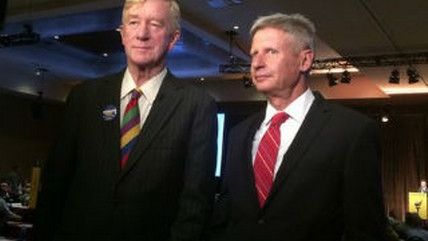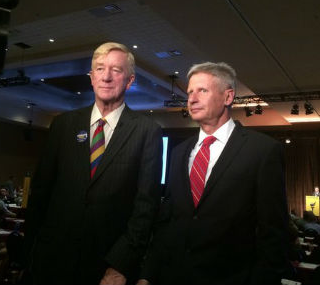Before Gary Johnson Can Debate Hillary Clinton and Donald Trump, He Needs to Be Included in Polls
To be included in debate, a candidate must be polling at 15 percent in five mainstream news polls, only one of which currently includes Johnson.


The most straightforward way for a third party presidential candidate to challenge the two-party system is to get into the presidential debates held in the month prior to the general election. But for candidates working outside that system, that's no easy task.
Since 2000, gaining entrance to those debates has required reaching 15 percent in the polls by an unspecified date that's generally around Labor Day. That means that an outsider candidacy has just a few months to appear on the same political horse-race polls which the major party candidates have been included on for more than a year.
This is the challenge faced by the Libertarian Party ticket of Gary Johnson and William Weld, which is currently deemed not viable enough by most of the major media companies who conduct the polls that will determine whether or not the two re-elected former governors (who will almost certainly be on the ballot in all 50 states this November) are "serious" enough candidates to share the debate stage with Donald Trump, Hillary Clinton and their running mates.
The American voting public has clamored for a viable third party option for years. According to Gallup, except for one brief dip under 50 percent, a majority of Americans have believed the country needs a legitimate third option since 2007. Yet the self-fulfilling prophecy that a vote for a third party is a wasted vote is conjured up by a number of factors, which are more institutional than ideological.
First, nothing bestows legitimacy on a candidate quite like appearing on a main debate stage. Forget the jockeying by Republican also-rans such as Chris Christie and Carly Fiorina, who repeatedly tried to claw their way into earning the coveted tenth spot in the recent interminable series of GOP debates.
Instead, consider what Ross Perot accomplished in 1992.
Without the backing of any political party, and after running an unusual, truncated campaign during which he dropped out in July only to re-appear in October, Perot still appeared in all 3 presidential debates with then-President George H.W. Bush and then-Arkansas Gov. Bill Clinton. The eccentric Texas billionaire eventually managed to win 19 percent of the popular vote. No third party or independent candidate has appeared on a main debate stage since. When Perot ran again in 1996, he didn't appear in the debates, and he only won about eight percent of the popular vote. The message is clear: getting on that debate stage matters.
According to The Commission on Presidential Debates (CPD)'s website, the 2016 criteria requires a candidate to be "Constitutionally eligible," to appear on enough state ballots to have "a mathematical chance of winning a majority vote in the Electoral College," and to "have a level of support of at least 15 percent of the national electorate as determined by five selected national public opinion polling organizations" sometime after Labor Day, "but sufficiently in advance of the first-scheduled debate to allow for orderly planning."
It's that last part that creates such a conundrum for third party candidates.
In 2012, the CPD used polls from ABC News/The Washington Post, NBC News/The Wall Street Journal, CBS News/The New York Times, Fox News and Gallup. The Commission has not yet announced which polls will determine 2016 general election debate participants yet. Of these polls, only Fox News has included Johnson so far in 2016.
Yet last March, a poll conducted by Monmouth University put Gary Johnson at 11 percent in a three-way race with Trump and Clinton. And this is with three-quarters of respondents saying they "don't know enough about him to form an opinion." Johnson, who has filed a joint lawsuit with the Green Party's Jill Stein and others against the CPD for what they describe as collusion with the two major parties, has argued that given the unfavorables of Trump and Clinton, plus the growing number of independents, he would be polling far higher if only he were included in national polls.
In a video chat at FiveThirtyEight, polling analysts Nate Silver and Harry Enten seem to agree with Johnson:
harry: I'm of the belief that pollsters should at least offer Johnson as an option to some respondents. Otherwise pollsters are putting their thumb on the scale, in my opinion. Johnson has more electoral experience than Trump does. Why isn't he serious?
natesilver: I agree. Some pollsters don't like to include third-party candidates because, for a variety of reasons, polls sometimes overstate their numbers. But it's not a pollster's job, in my view, to take that choice away from the voter when they'll have it on the ballot. They can always ask the question both ways, too — with Johnson and without.
Chris Jackson of the market research firm Ipsos tells Reason that the decisions on which candidates are included in their polls are "driven by our media partner, Reuters," but that he expects that Johnson will now likely be included in certain polling questions. Jackson says that "in earlier phases, we tend not to include third party candidates because there's just so much in the air" and the limited space they have on surveys needs to be managed somehow.
When I asked Gary Langer of Langer Research Associates (which conducts the ABC News/Washington Post polls) about the challenges faced by third party candidates in trying to make it into big-time polls, he said that even though he conducts political horserace polling, he thinks "it would be better if we tried to smarten up polling" and not focus so much on what he says is a "misguided"* question: "Who would you vote for if the election were held today?" Langer thinks that question bears little indication on how people will actually vote on Election Day.
Langer also is unconvinced that there is a "bandwagon effect," where candidates appear to be riding high in polls, and that that alone is enough to propel them all the way to the White House. He points to Rudy Giuliani and Hillary Clinton's formidable early leads in the 2008 election polling as examples of how "campaigns matter" and that candidates with little support, like Donald Trump last summer, come to the forefront once "the public comes to a decision" about a candidate.
Cato Institute research fellow Emily Ekins, the former polling director for the Reason Foundation (the non-profit which publishes this website), says she doesn't believe it's inherently unfair that Johnson hasn't been included in most 2016 polls to date, because even with his experience as New Mexico's governor he only won about one percent of the vote when he ran as the Libertarian Party presidential candidate in 2012.
But, Ekins adds, Clinton and Trump "are underwater with their unfavorables" and the fact that so many "political elites — whether they are grassroots activists or journalists or lawmakers or policy wonks" find both major party candidates so unlikable that they are actively searching for a third party alternative, and that this is affecting how the media covers third parties, which will also affect how they are polled.
Still, the fifteen percent threshold is extremely difficult to reach, particularly when competing against major party candidates who have been included in polling for more than a year.
George Farah, the executive director of Open Debates, told CBS News in 2012 that it is not necessary to let the hundreds of candidates who have filed papers with the Federal Election Commission (FEC) onto the debate stage. If the CPD lowered the polling threshold to just five percent, a more varied set of political representation at the debates would be provided.
Farah also noted that this standard would have allowed Perot to debate Bill Clinton and Bob Dole in 1996, and Pat Buchanan and Ralph Nader would have been able to provide an alternative to Al Gore and George W. Bush in 2000. But that's it. It's not like Vermin Supreme would be making a mockery of the process if the door were opened just a bit wider for third party candidates, five percent is still a plenty high bar to set.
And given that the current (supposedly) respectable major party choices consist of an incoherent, bloviating reality TV star and a former secretary of state currently being investigated by the FBI, a little variety at the debates can't be a bad thing.
*-This post has been updated to correct an error made in this particular quote.


Show Comments (82)